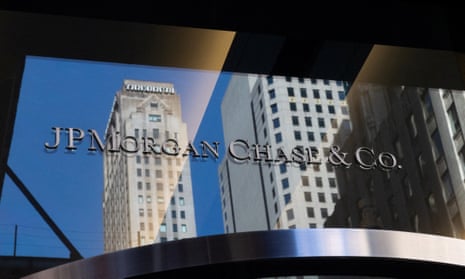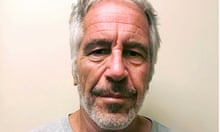JPMorgan Chase reached settlements with the US Virgin Islands (USVI) and former executive Jes Staley to resolve lawsuits over sex trafficking by the disgraced financier Jeffrey Epstein, largely resolving a scandal that has weighed, for months, on America’s largest bank.
The settlements conclude the final pieces of litigation in a saga involving women who said Epstein sexually abused them, and in which embroiled some of the world’s most powerful figures in finance and business.
JP Morgan said its $75m settlement with the USVI includes $30m to support charitable organizations, $25m to strengthen law enforcement to combat human trafficking, and $20m for attorney’s fees.
Terms of the bank’s settlement with Staley are confidential.
In June, JP Morgan agreed to pay $290m to resolve claims by dozens of Epstein’s accusers.
Epstein had been a JP Morgan client from 1998 until 2013, when the bank terminated their relationship.
“While the settlement does not involve admissions of liability, the firm deeply regrets any association with this man, and would never have continued doing business with him if it believed he was using the bank in any way to commit his heinous crimes,” JP Morgan said.
A trial had been scheduled for 23 October.
Ariel Smith, the attorney general of the Virgin Islands, said: “This settlement is an historic victory for survivors and for state enforcement, and it should sound the alarm on Wall Street about banks’ responsibilities under the law to detect and prevent human trafficking.”
As part of the settlement, the bank said it would remain “committed to previous and ongoing efforts to fight human trafficking through its anti-money laundering program.
“There are no new commitments. Our controls, compliance, risk, and other functions are always improving, and we are continually investing to become even better,” said Patricia Wexler, an attorney for JP Morgan.
“We have always worked closely with law enforcement to help combat human trafficking, and we will continue to look for ways to invest in advancing this important mission,” Wexler added.
Marci Hamilton, founder of children’s rights group Child USA, said the settlement served “as a profound, landmark moment for women and girls that have fallen prey to human trafficking across the country and beyond.
“Our nation’s biggest banks have been put on notice.”
Epstein died in August 2019 in a Manhattan jail cell while awaiting trial for sex trafficking. New York City’s medical examiner ruled his death a suicide.
In July, USVI said it wanted JP Morgan to pay at least $190m, including a $150m civil fine, and possibly much more to resolve the lawsuit.
USVI said JP Morgan kept Epstein as a valued client even after his 2006 arrest on prostitution charges and related guilty plea two years later, and said some bank officials stayed in touch with him long after he was dismissed.
Both lawsuits exposed deficiencies in JP Morgan’s oversight of clients, including many communications where employees urged the bank to stop doing business with Epstein.
Tuesday’s settlement resolves a rare public relations problem for Jamie Dimon, who has been JP Morgan’s chief executive since 2006.
Dimon testified under oath in May that he had barely heard of Epstein until the financier’s July 2019 arrest.
JP Morgan had argued that the USVI was also to blame for enabling Epstein’s sex trafficking by giving him tax incentives and waiving monitoring requirements, in exchange for cash and gifts to local officials, including a former first lady.
Epstein had owned two private islands within the territory, including one he allegedly bought to keep onlookers from spying on his misconduct on the other.
Last November, USVI reached a settlement of at least $105m with Epstein’s estate.
Deutsche Bank, where Epstein was a client from 2013 to 2018, in May reached a $75m settlement with women who said Epstein sexually abused them.
Reuters contributed to this article










